Answer these simple questions and we will find you the BEST prices
Which type of solar quotes do you need?
It only takes 30 seconds
100% free with no obligation

Get up to 3 quotes by filling in only 1 quick form

Compare quotes and find yourself the best deal

Increase the value of your home by installing a new boiler
- Householdquotes.co.uk
- Boilers
- Conventional Boilers: Heat Only, Regular & Open Vent
Conventional Boilers: Heat Only, Regular & Open Vent 2024

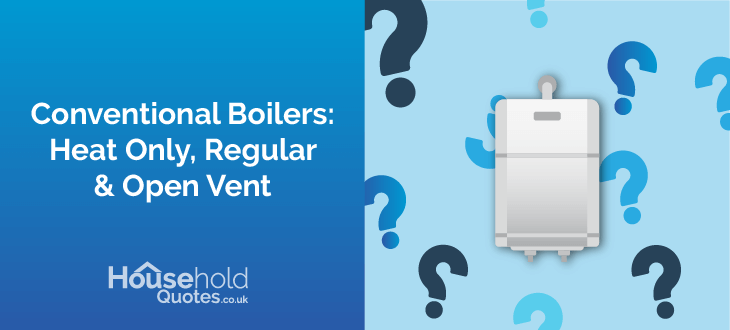
- Conventional boilers, also known as heat-only or regular boilers, are traditional heating systems suitable for larger households.
- Despite conventional boilers being one of the oldest types of boilers, they are a perfect choice for households with higher hot water demands that already have had a conventional boiler previously installed. This allows homeowners to avoid the extra pipework during boiler installation.
- Conventional gas boilers remain one of the most popular boiler types in the UK since there is a well-developed natural gas grid throughout the country, reaching over 70% of homes. This makes natural gas a highly accessible and convenient fuel source for boilers.
In this article, we will guide you through the most important aspects to know about conventional boilers, including what they are, their advantages and disadvantages, the different types available, and how they compare to system and combi boilers. We will also cover how a conventional boiler works, providing a comprehensive understanding of its workings.
Moreover, if you are considering a conventional boiler, it is firstly necessary to evaluate your specific needs and preferences to make the right choice for your home. If you have multiple bathrooms or a high demand for hot water, a regular or heat-only boiler may be a better choice for you than for instance a combi boiler.
Since the type of boiler you end up choosing depends entirely on your circumstances, we highly recommend consulting with a qualified boiler installer to discuss your specific needs and get recommendations for the best boiler type for your home.
Calling and looking for multiple installers to compare boiler quotes and ensuring you’re getting the best boiler deal on the market can take several hours, if not days of tedious hard work. This is why we highly recommend using our hassle-free service for an effortless new boiler comparison.
Simply click the button below, complete our short 30-second online form, and we’ll connect you with our trusted network of boiler specialists. Then, you will receive up to 3 completely free and non-binding quotes.
- Quotes from local installers
- Payment by finance available
- Save up to £975
It only takes 30 seconds

What is a conventional boiler?
If you're wondering “What is a conventional boiler?”, it is one of the oldest types of boilers and is also known as a regular or traditional boiler.
Conventional boilers are often referred to as heat-only boilers since they can produce hot water for central heating but not for taps, baths, or showers. For this to happen, conventional boilers will need extra parts, such as a hot water cylinder and a cold water feed tank in the attic.
Therefore, due to their additional components, conventional boilers require more space than their combi counterparts, for example. This makes them less suitable for smaller homes or flats with limited space.
If space is a concern, a combi boiler might be a better choice, as it has a more compact design and can provide hot water directly without the need for external storage tanks.
In general, conventional boilers are a good option for homes with high hot water demand, such as those with multiple bathrooms. They are also a good choice for homes with existing pipework that is compatible with conventional boilers since this simplifies the overall boiler installation procedure and speeds up wait time.
How does a conventional/regular boiler work?
As seen in the conventional boiler diagram above, for heat-only boilers to provide heating, cold water from the tank in the attic descends into the boiler. This water deposit is typically positioned as high above the boiler as possible to enhance water flow.
When the boiler activates, a heat exchanger heats the cold water before it is pumped to the radiators for central heating or the hot water cylinder for domestic hot water use.
Once in the hot water cylinder, the water is distributed to the taps/showers as required. You can simultaneously use multiple hot water outlets without experiencing a reduction in the hot water flow or its temperature, positioning conventional boilers as a great option for larger households with high heating and hot water needs.
Is a conventional boiler the right choice for me?
To determine if a conventional boiler is the right choice for you, it is important first to consider several factors. Among these factors, your heating needs, the size of your home, boiler efficiency and the necessary pipework must be considered.
Having said this, it is important to look at the advantages and disadvantages of conventional boilers bearing in mind the factors previously mentioned.
Pros of a conventional boiler
There are several advantages to using conventional boilers, including their ability to meet high demands for heating and hot water due to their large storage capacity. This makes them an excellent choice for homes with multiple bathrooms and a high demand for heating and hot water.
They are also simple to replace with a new regular boiler, as there is no need to adjust the pipework or remove components such as the cold water tank. What is more, new models of conventional boilers, despite them being the oldest boiler type, are highly efficient, with condensing technology improving their efficiency by up to 97% in some cases. This can help reduce heating bills and overall energy consumption.
Despite their traditional nature, conventional boilers remain widely present in UK homes. Many are being modernised to be future-ready, integrating features like a hydrogen-gas fuel blend and compatibility with solar thermal panels, making them an eco-friendly option for hot water generation.
Cons of a conventional boiler
In addition to the benefits, it's important to consider the drawbacks of heat-only boilers. One of the most apparent disadvantages of conventional boilers is their large size, attributed to the water storage tank and hot water cylinder, which makes them unsuitable for small houses or apartments.
It’s also worth considering that instant hot water is not always available. While it is possible to have hot water from multiple taps or showers simultaneously, the hot water cylinder will need time to refill if all the hot water is used at once. Homes with high hot water demands may need larger or multiple cylinders.
The installation of a new conventional boiler can be expensive, as it requires the installation of separate parts throughout the house. However, as mentioned above, replacing a conventional boiler with a new conventional boiler is likely to be cheaper, as the existing pipework, water, and gas installations can be utilised.
To simplify things for you, we have compiled a breakdown of the advantages and disadvantages of regular boilers in the image below.
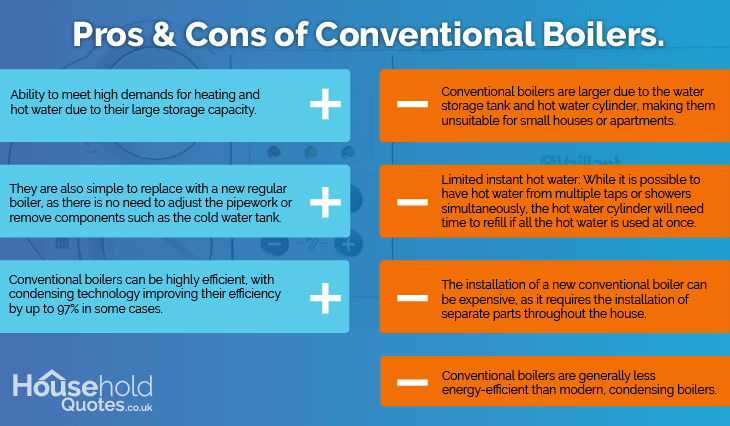
All in all, opting for a new conventional boiler is a great option for those households with high hot water and heating demands that already have a regular boiler installed in the first place, as this will reduce new boiler costs, waiting time and pipework.
Nevertheless, it is highly recommended to consult a professional boiler installer to assist you in selecting a new boiler that meets your specific requirements before making a final decision.
Since finding qualified local boiler installers for the best price often involves spending hours of your time doing tedious research, we highly recommend taking advantage of our service to spare you from this nerve-wracking experience.
At Household Quotes, we're dedicated to helping by linking you with our reliable supplier network. Our free and non-obligatory service saves you time and effort by offering up to 3 quotes from our trusted suppliers instead of spending countless hours calling them one by one by yourself.
Click the button below and complete our brief 30-second online form to access our free service now.
- Quotes from local installers
- Payment by finance available
- Save up to £975
It only takes 30 seconds

Different conventional/regular boiler types
Considering the advantages and disadvantages of heat-only boilers is a wise step before reaching a final decision, as it helps clarify our preferences and priorities. However, when traditional boilers come to mind, it's important to differentiate between the various types of conventional boilers.
Gas conventional/regular boilers
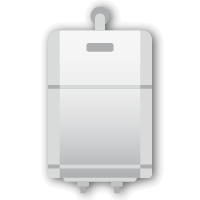
While not the latest technology, conventional gas boilers remain popular in the UK due to their compatibility with the widespread natural gas grid, offering convenience and familiarity for many homeowners.
Despite their traditional design, modern versions have been designed to operate on a 20% hydrogen blend, making them adaptable to potential energy transitions. This adaptation to greener fuel sources ensures conventional gas boilers remain relevant as the UK strives for more sustainable energy solutions.
Additionally, the introduction of condensing conventional boilers that use condensing technology to better use the heat they generate has allowed conventional boilers to catch up and still be considered an alternative to system and combi boilers.
When a fuel such as gas or oil is burned, gasses are released via a flue. In a non-condensing boiler system, these gasses would be released into the atmosphere and their heating potential would be lost. However, in a condensing boiler, the hot gasses are captured and recycled back into the system through a heat exchanger into what's known as the primary circuit.
It's important to note that the combustion of natural gas produces carbon monoxide (CO), but when installed by a Gas Safe Registered installer as required by law in the UK, conventional gas boilers pose minimal safety threats.
On a final note, even for those not connected, many conventional gas boilers are compatible with liquefied petroleum gas (LPG). While gas is generally more economical than electricity, the energy price cap is subject to change in the coming years.
Oil conventional/regular boilers
Conventional oil boilers can be a good alternative for homes without access to the national gas network. However, they require a fuel storage tank and careful oil level monitoring, which may not be suitable for homes with limited space.
On top of that, the UK government's 2035 ban on the sale of oil boilers makes them a less advisable long-term option, especially for those connected to the gas grid. Despite this, conventional oil boilers can still be purchased and installed before 2035, making them a viable choice for homes in rural areas off the gas grid for the time being.
Oil provides flexibility with various suppliers and potential cost savings. Similarly to conventional gas boilers, the emergence of condensing technology has made oil and gas boilers more efficient in utilising the heat generated by fossil fuels. This still makes them a viable option for those considering a new boiler.
While oil boilers remain suitable for some in the short term, it's important to explore alternative heating options for future compliance and sustainability due to the upcoming ban.
Electric conventional/regular boilers
Conventional electric boilers are widely known for their energy efficiency, effectively converting electricity into heat. Like oil-fired conventional boilers, they do not require a connection to the national gas grid, making them an advisable long-term option for off-grid households due to environmental and governmental restriction concerns.
However, it is crucial to consider the sustainability of conventional electric boilers by evaluating their source of electricity. Relying on electricity generated by burning fossil fuels can diminish their sustainability while also leading to higher running costs.
In terms of drawbacks, electric regular boilers can lead to higher running costs due to the relatively higher price of electricity compared to gas. Therefore, it is important to ensure that the electricity used is generated from renewable sources of energy.
Despite these considerations, their sustainability compared to traditional boiler types, such as oil and gas conventional boilers, makes them noteworthy, as they can utilise electricity generated from renewable sources such as solar energy.
Conventional boiler vs combi boiler
Conventional boilers are largely considered to be good alternatives for large homes with a high hot water demand. However, they require extra space for the boiler unit, hot water cylinder, and cold water feed tanks, making them less suitable for most homeowners.
Combi boilers are the most popular type of boiler in the UK due to their compact size, easy installation, and cost-effectiveness. They heat hot water and central heating from the same unit, eliminating the need for a hot water tank. However, they may not be powerful enough for very high hot water demand, making them better suited to small-medium homes with less than 2 bathrooms.
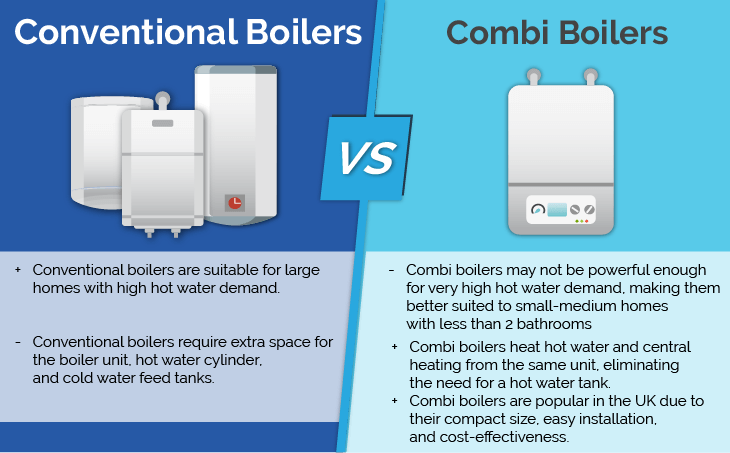
The choice between a regular and a combi boiler depends on the specific needs of the homeowner. Combi boilers are more popular due to their compact size, easy installation, and cost-effectiveness. However, for larger homes with a high hot water demand, a regular boiler may be more suitable.
Conventional boiler vs system boiler
When deciding between a system and a conventional boiler, the answer is not as straightforward as the comparison between combi and regular boilers. Therefore the following question remains: system boiler vs conventional boiler, which one to choose?
Both system and conventional boilers are good choices for larger households with high heating and hot water demands. However, the tide is more favourable for system boilers, as they generally have better and updated technology than their conventional counterparts.
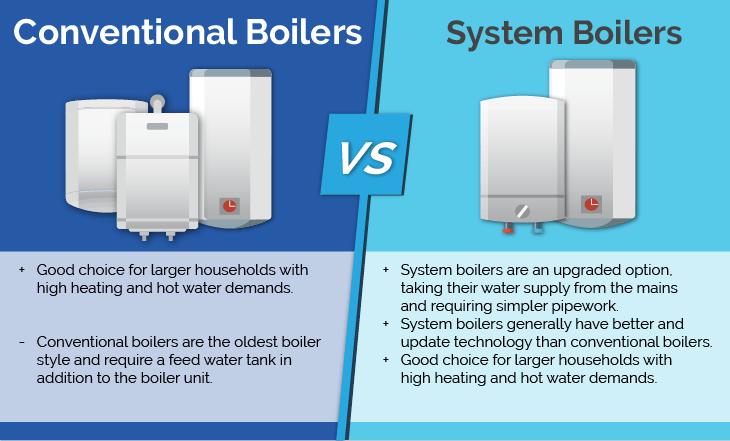
System boilers are an upgraded option, taking their water supply from the mains and requiring simpler pipework, while conventional boilers are the oldest boiler style and require a feed water tank in addition to the boiler unit. Ultimately, the choice between a system and a conventional boiler depends on the specific needs of the homeowner.
Find conventional boiler suppliers in the UK
Altogether, the process of finding conventional boiler suppliers near you can take several hours, if not days, of careful planning and research.
This is not ideal, especially if you need an urgent boiler replacement. To save you all this time and effort, use Household Quotes' free quotes comparison service. We have a whole network of vetted professionals that we can put you in contact with.
Simply fill out our 30-second form, and then you’ll hear back from up to 3 local boiler installers. You can then compare their tailored quotes and choose the best deal.
This service is free, and fast, and you’re under no obligation to accept any of the quotes you receive. Get started today by clicking the button below:
- Quotes from local installers
- Payment by finance available
- Save up to £975
It only takes 30 seconds

FAQ
System boilers are more convenient and upgraded, drawing their water supply from the mains and having simpler pipework. On the other hand, conventional boilers, the oldest boiler style, require a feed water tank in addition to the boiler unit.
Therefore, the decision between a system and a conventional boiler ultimately depends on the specific requirements of the homeowner and the type of boiler they already have.
Conventional oil boilers generate heat and hot water for your household using oil, making them a good alternative for off-grid households as they don’t require a connection to the national gas grid.
Conventional boilers, also known as heat-only or regular boilers, are among the oldest types of boilers, producing hot water for central heating but not for domestic use. To provide hot water for domestic use as well, they require both a large water storage tank and a hot water cylinder.
Yes, although conventional boilers may seem outdated, they are still widely installed in UK homes. Many are now being upgraded and designed to be future-ready, incorporating features such as a hydrogen-gas fuel blend.

Alejandro, a copywriter at Household Quotes with a background in law and content creation, is passionate about sustainable and affordable home improvements, and how the EU is adapting its policies to combat climate change.
- Conventional Boilers: Heat Only, Regular & Open Vent 2024
- What is a conventional boiler?
- How does a conventional/regular boiler work?
- Is a conventional boiler the right choice for me?
- Different conventional/regular boiler types
- Conventional boiler vs combi boiler
- Conventional boiler vs system boiler
- Find conventional boiler suppliers in the UK
- FAQ
